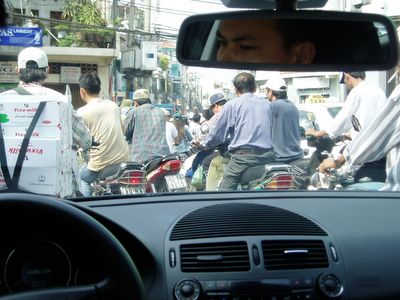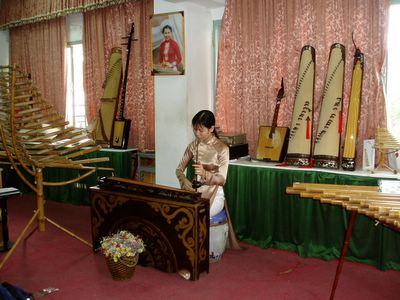Chaos, Culture and Communism
I am back from a visit to Saigon, Vietnam. It's now known as Ho Chi Minh City (and his likeness is everywhere, whether in the form of painting, photographs or sculpture, so you can hardly miss him) but Saigon is so much more evocative. Before leaving, I had visions of Miss Saigon, the musical, in my mind - vibrant colours, smoky cramped spaces, exotic looking women. Turns out I was right, sort of.
I kept a detailed journal of my first 2 days there, before nightly exhaustion took over, and took copious mental notes of the other days. I plan to post a full account when time permits. For now, this post will deal with some quick impressions I had of Saigon.
Chaos

Taken from the backseat of a car while going down Le Van Sy St. I can't imagine being in the driver's seat! This was pretty much how the streets are like the entire time.
The first night in Saigon was just a ruthless and relentless assault on the senses. The motorcyles were rather overwhelming just in terms of sheer volume. Sitting in the cab, I was first struck by how many there were and then, rather awed by the way they had no regard for traffic rules. But that multiplied a million times when I took to the streets and was confronted with having to cross the roads with motorcycles and cars barrelling towards me from all directions. The sounds of horns blaring was a constant and after a while, one learnt to shut it out. But on that first night, it was unnerving to hear the cacophony of honking and tooting. There was no respite from it and the heart was constantly jumping at the sound.
The pavements of Le Van Sy Street were narrow, crowded and so badly paved, they should be called something else. In many spots, parked motorcyles and street peddlers took up the whole five-foot-way, so pedestrians had to walk on the actual road, and come literally within centimetres of the throngs of motorcycles.
Culture

Taken in the room holding the musical instruments collection of the Reunification Palace. The lady is playing a one stringed instrument, reportedly one of the oldest musical instruments in the world. She was amazing; a multi-talented artist who demonstrated several of the instuments in the room. I took her name card, but left it in my pants pockets and it came apart in the washing machine!
Compared to many parts of Asia, Saigon appeared relatively untouched by influences of the outside world. Most people were dressed in "western" style clothes, but many ladies still wore the traditional costumes, even in going about their daily activities.
Their food was also largely local and the fast food invasion has not taken place. In fact, the Vietnamese diet is antithetical to Western fast food, with its abundance of vegetables and minimal use of oil. In the 6 days I spent there, I was hard-pressed to find more than 15 Vietnamese women who could be considered as being even slightly overweight. They were uniformly slender, due no doubt to their homogenously indigenous diet. Which is not to say that Vietnamese cuisine is without variety - I learnt that the food differed substantially from province to province in a very large country. However, the ingredients are always heavily weighted towards vegetable and light on oil and fats.
I think the society is still offensively patriarchal. Women, young and old, were everywhere, working. While I also saw many men hard at work, there were also far too many instances where I noted people indulging in the "loitering" culture (what in Malaysia we call the "lepak" culture) of hanging around doing nothing much, and it was only men who were doing this. Later, I had some personal contact with Vietnamese people, and while I would not call them overtly patriarchal in their attitudes, their words and actions served to solidify my initial impression.
Communism

Yet another of my shots from inside a car. This is one from a street that was lined with such flags on both sides. Note the high walls and gates in the backgound. Behind these are huge colonial type mansions. I am told that these were seized by the Communists when they took over in 1975 and now house either government officials (or their family and friends) or are rented out at exhorbitant rates to companies to be used as commercial space - no prizes for guessing who the rent-collectors are!
I am not sure what I expected, but I was somehow not quite prepared for the green-uniformed military personnel who manned the airport immigration and customs counters. The get-up, with the red stripes and stars on shoulders, was just so stereotypically Communist.
Vietnamese free-to-air TV was mainly Communist propoganda. Even without understanding a word of Vietnamese, it was so obvious from the images that the broadcasters were proclaiming the glory of the Party and what it has done for the People. One of the sights that may have scarred me for life was a baritone in a petrol blue suit and really outdated hair, singing a nationalistic song in an operatically trained voice, while standing on a stage with a red and white flag of the sickle forming the main backdrop. I didn't know what he was singing, but the tune alone was enough to let anyone know that it was a Patriotic Song. It had all the right spirited oom-pah and nominally soaring chorus. It was an amplified version of every bad memory I had of old Malaysian variety shows during National Day month.
There was one part of the city where the street was lined on both sides by flags bearing the sickle. There were also huge red banners with words and images in white relief. These looked very much like the banners proclaiming Chairman Mao that I had seen in China and in history books. It's strange how the colours red and white, when presented in a certain way, just scream "Communist" even when one doesn't understand the words that are written.
I am told that the Communist party controls everything that is disseminated in the local media. TV, radio and the press are heavily controlled and censored. But how will they keep out the Internet? Returning overseas Vietnamese will also bring with them tales of different systems abroad. I understand that most people in Saigon are closet capitalists who are sanguine about Communism; they live with it because they must. The propoganda doesn't really take. In fact, one cab driver (who miraculously could speak Cantonese, after a string of 13 cab-drivers with whom we could not communicate at all) informed us that most people in Saigon had at one stage or other tried to leave Vietnam to escape the Communists. I wonder what it's like in Hanoi, the seat of power for the Communist party and the centre of the former North Vietnam. Do the ideals of Communism beat more strongly in the hearts of Hanoi residents?
Final thoughts for the night
I enjoyed visiting Saigon; it is so different from Singapore and Malaysia. In many ways, it was like a throwback to my earlier years in the East Coast of Malaysia, with many things still done in an old-fashioned way.
Communication was a problem, with most people not speaking English and most signs monolingually in Vietnamese. Outside of Chinatown (where some spoke Cantonese) and the City Centre's tourist belt (where some knew enough English to transact), shopping was a problem and so was ordering food. It was truly a relief to see an English language newspaper when we were getting on the plane to come back. I had not attacked The New Straits Times (I was on MAS) with such enthusiasm in a long time, perhaps ever.
Ultimately, I think visiting a place like Vietnam reminds me of how lucky I am to live where I do and to have been born where I was. Sadly, I could see that there is a lot of poverty in Saigon and the level of hygiene in some parts is catastrophic. My hotel had occasional power stoppages which are apparently commonplace throughout certain parts of the city. The traffic problems are a daily reminder of a corrupt government that has failed to take a problem in hand, and has now lost control of it. Whatever else we may complain about here, at least the streets are clean and we can cross the roads without having our hearts stopping.
Labels: HappeningToMe

